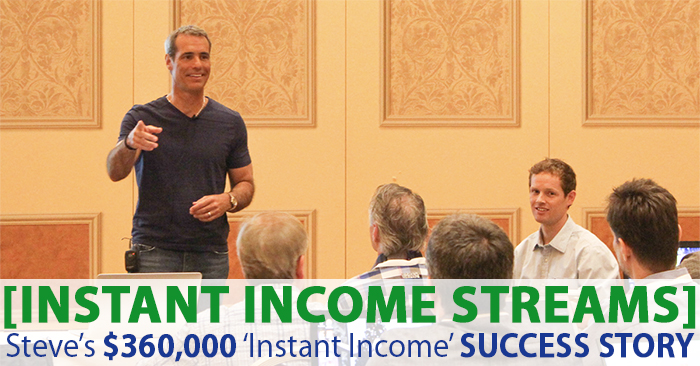
Hi, and welcome to another ‘1st of the month’ blog post!
This month I’ve asked my business partner, Steven Clayton, to share a story about how he was able to generate $360,000 by BUYING a pre-existing income stream.
We cover:
- How Steve bought an online business for $50,000, and generated over $360,000
- Six reasons why buying an online business is a good idea
- The TWO things to watch out for when buying an online income stream
- How to determine what an online business is worth
- The best places to buy (and sell) online businesses
- Seven important considerations when buying an online business
- The 3-step buying process (and how handle due diligence)
- And MUCH more…
I’ll now hand this over to Steve to dive into the juicy details!
++++++++ ++++++++ ++++++++
My Story: How I made $360K with almost no work at all!
 What if you could simply purchase an already successful online business?
What if you could simply purchase an already successful online business?
Imagine that all the hard work and heavy lifting is already done for you…
You purchase the business, and immediately, you are making money online. Perhaps for years to come and enjoying a crazy return on your initial investment.
That’s what I’ve been able to do, and I’m going to show you exactly how to do it.
Buying online businesses is making a comeback.
And because so few people are focusing on this opportunity right now, you have the advantage of taking an early lead.
Six reasons buying online businesses is a good idea…
- You have immediate access to a new and profitable niche. This can provide a whole new direction for your company.
- Even if you’re just starting out, you feel like a “pro”. There’s nothing like purchasing something “off the shelf” and find you’re immediately bringing in real income.
- Positions you for future/bigger deals. Whether you buy a website for $5,000 or $10,000,000 the process is identical — the due diligence, considerations, terminology. Practicing on less expensive purchases has less risk. And it’s a great way to enter new niches.
- You have the potential for business references. You get immediate “street cred”. That’s important if you’re looking to expand your company, perhaps bringing investors on board.
- Takes you from “if” I can make this work to “how much” can I make it work. You’re not starting from scratch.
- Instant diversification. While diversification is important in any business, it’s even more important in the online world because of the fragility of certain business models.
Why it’s not always a good idea to buy online businesses…
Risk.
That’s the single biggest – maybe the only reason, short of not having the initial capital – to not buy attractive businesses.
Will this site remain in the top of search engine results for keyword phrases? Will referrals continue? Is it paid traffic? Will the suppliers provide the same materials and the same deal if you buy the company? Will the market change?
There are two ways to mitigate risk: Due diligence and cost. Cost is about how much you pay. But the bigger factor is due diligence.
Let me show you how this works with a real-life example.
The Story
A few years ago, I was successfully showing a profit with my own affiliate marketing business, but I wanted to expand my business further.
I wanted to diversify to protect against downturns, as well as promote growth by exploring new niches. I had the cash from my original start-up success, so I started to look for online properties to buy.
One of my best return on investments was a business owned by an individual (rather than a company) that I found on Flippa.com (by the way, I don’t recommend this site anymore… you’ll find the sites I do recommend below).
The owner was asking $50,000 for an affiliate marketing site that was relying 90-95% on SEO for traffic. The site was earning about $35,000 per year. She had a small PPC (pay-per-click) presence, pretty much just experimenting with it. But PPC happened to be my specialty at the time.
I was very interested because I thought I could take this $35,000 per year business and have it earning $60,000 or even $70,000 a year in short order.
How to determine what an online business is worth
You’re probably wondering a couple of things:
- What made this particular business attractive enough for me to pay $50,000?
- And how do you figure out what to offer for an online property?
So let’s talk about how to determine value. This is important because when you start to look at online businesses that are for sale and think about potential deals, you’ll need to understand this.
Businesses – all businesses, not just online businesses – are usually valued at a “multiple” of earnings or profit with industry standards generally determining the multiples.
A large retail operation might be valued at 3X multiple. It’s a multiple of profit or a multiple of earnings. A 2X multiple means two times the yearly profit. So if a website is making $100,000 in revenue with $30,000 in profit after expenses, a 2X multiple would mean a $60,000 purchase price.
Currently micro online businesses – those having less than $5,000,000 a year in revenue – are usually on the lower end, bringing in 1-3X. So this $100,000 revenue site that makes $30,000 in profit, will usually sell for between $30,000 and $90,000, typically on the lower end.
The risks drive the multiples.
If you have a website that uses PPC traffic, there is a low barrier to entry for competition so there is a lot of risk. If you’ve got two brick and mortar stores in a downtown area, the barrier to entry is pretty high. So the risk is lower, at least in some ways.
Consider what drives the multiple. It might be lower than you think. The online marketing landscape could change dramatically within a year. Which is why many businesses are really only worth 1X.
$50,000 for the affiliate marketing site I was considering was at the lower end of the multiple, plus I already had some ideas and experience to bring to the table that I was confident could generate additional profit.
What type of businesses can you buy?
There are a lot of online business types, but the four preferred models that come up most for sale are:
- eCommerce
- Affiliate
- Adsense
- Information Products
There are variations of these models, but the process, the terminology and the due diligence are pretty much the same for all business types.
Where to find the best deals
For buying an online business, I highly recommend the following broker sites. They offer businesses for sale, package them and facilitate the meeting of buyers and sellers.
- www.empireflippers.com
- www.feinternational.com
- www.quietlightbrokerage.com
- https://flippa.com/deal-flow
You can also simply “knock on doors”.
If you find an interesting website – one that would add to your portfolio, fits with your niche or is a good way to expand your company – there’s nothing wrong with asking if they would consider selling.
Seven considerations when evaluating sites
- At least a full year of history to reflect seasonality. Christmas is especially important when considering retail and ecommerce sites.
- At least $500 in profit each month for the last 4-6 months. Less than 4 months is too unpredictable because there is not enough data.
- Consistent traffic with no unusual spikes. Be highly suspicious of huge traffic spikes. Unfortunately, there are companies who decide to sell, but three months before they put the site on the market, they pad the stats by sending all sorts of expensive PPC traffic to it. That strategy is not sustainable due to the expense.
- The site should not have been sold within last twelve months.
- Make sure it passes all due diligence checks (see below).
- Have some synergy targets, ways that you can improve the business and increase the revenues.
- Have a great broker.
The Buying Process
- You find a deal that looks good and meets the initial “sniff test”. Examine the prospectus (which provides general information about the site). You’re not signing up at this point, just determining if it looks legit.
- Provide seller with a letter of intent. They see you’re very interested, that you intend to buy this business depending on the results of your due diligence. It’s not binding; you can still walk away for any reason.
- The seller creates a Data Room. This is a package of information, usually in a virtual folder, where the seller discloses everything to you – every scrap of information – or you walk. If a seller refuses to provide requested information, walk away. This information is crucial to your due diligence.
- Consider the things you bring to the table. What is the potential return on revenue, traffic and so forth? Then determine what price makes sense to you to make it a worthwhile purchase.
- Make your final decision and enter into a contract.
The Due Diligence Process
You can’t always believe what you’re told. You have to do some hands-on verification. Does the story you recreate about this online business match up with the seller’s claims?
There are three basic steps to the due diligence process (Due diligence factors will vary somewhat, depending on which type of business you’re considering.):
Step 1: Understand the “story” the seller is telling you about traffic sources, conversion vehicles, inventory and affiliate products, AdSense… Get complete, total statistics and information – every single metric.
Step 2: Verify every metric with proof. Do the web host stats match traffic? Does the conversion rate make sense? Do the affiliate management company reports show the same number of units? Do the bank deposits and PayPal reports add up? Take the information the seller is providing and verify that it is true and accurate
Step 3: Build your own “story” with all the proof. Does it all really add up? Does it make sense? Ask for clarification where it doesn’t make sense. Your verification has to match up.
Here’s an example of the due diligence process in action:
The Claim (the seller’s story):
This is an eCommerce website that’s been around for two years, claiming $100k in sales per year and $35k annual profit. Available accounting reports show the claimed revenue and profit for last 6 months or so. They use PayPal as their payment processor and they use an outsourced fulfillment center.
In the Data Room (the seller’s documentation):
- Website traffic for last 6 months (by month)
- Website traffic sources for last 6 months (percentage by month) including reports from the web host, PPC, organic and referral traffic
- Last 6 months of purchase orders and inventory reports to verify expenses
- Last 6 months of PayPal reports
- Last 6 months of outsourced fulfillment reports showing all sales fulfilled/transactions
Crunching the numbers (reverse engineering the seller’s story):
- Website traffic shows 8500 visitors per month, 90% SEO and 0% PPC
- PO’s show an average expenditure of $25 per unit
- PayPal shows sales of $8000 per month
- Outsourced fulfillment report shows 160 units per month fulfilled at a cost of $6.25 per unit
Now that we have the data, can we build a story that matches what the seller has claimed?
- 8500 visits and 160 people buy – 1.8% conversion rate
- All free traffic
- Revenue – 160 * $50 or $8000 per month
- Cost of goods – $25 + $6.25 = $31.25
- Profit – 160 * ($50 – $31.25) = $3,000 or $36k per year
When your story matches their story – using their data – that’s good. That’s what should happen.
But what if the stories don’t match?
- 8500 visits and 160 people buy – 1.8% conversion rate. But if the data only shows 3500 visits per month the conversion rate would be 4.5%. That’s a warning sign. Is something being hidden?
- What if there is high PPC traffic? Where’s that cost? Why wasn’t it disclosed? That means that the profit must be lower than claimed.
- What if the referral traffic is high? What is the unreported source? Will they still refer after the sale?
- What if the PayPal transaction report doesn’t add up to $8k per month?
- What if the PO’s for the manufacturer shows $35 per unit?
- What if the cost for fulfillment reports show $10 per unit?
If the numbers don’t add up, it’s not necessarily indicative of dishonesty, but you must find out why things aren’t matching up.
Is someone trying to pull a fast one or was there just an honest mistake? Find out.
You need all the information to make an informed buying decision.
As Ronald Reagan advised, “Trust and verify!”
I ran our site for about six years and made roughly $60,000 per year totalling $360,000 over that period. Not bad for having paid only $50,000! This was one of the top 5 business investment I have ever made (in terms of ROI on a hands-off one-time investment). It sent me down a profitable path that I’ve been following for a decade.
Buying online businesses can be a very lucrative. With due diligence and the right broker, you can minimize the risk and position yourself for success with incredible profitability.
Got a question, a comment, or perhaps a buying/selling story of your own? Use the comment box below, we’d love to hear what you think!







Inspirational story, thanks for sharing. I’ve just taken a look at the empire flippers marketplace, some of the web properties listed there are amazing! Very cool.
Yeah, it’s a whole new world, very much worth exploring!
thanks for sharing Steve.
you’re welcome!
Great story Steve. I have a question not related to this, but to my 100k Ultra site.. I’m at a run rate of about $35/day (profit) now but am struggling to scale, because when I increase ad spend, the profitability drops. I’m only using Mobile placement right now. Do you have any advice or tips to help me scale this better? thanks!
Hi Brian, firstly, great start in getting to $35/day… thats already about $13,000/year, and you should now be able to scale this quite nicely. Without knowing more information about your ads, products, and target interests, it’s difficult to say exactly what you should do. What I will say is that I think you should:
1. Test Desktop placement… often times this also works very well
2. Identify the winning age bracket and gender, and create new micro-budget ads targeting this specific combination of age/gender for a few new interest targets
3. If you’re not using lookalike audiences yet, start using them.. these are often the most profitable (and scalable) of all.
4. Test, test, test! Try different pricing combos… ‘free + shipping’, ‘low price + free shipping’, etc
I’m sorry I can’t give you more specific info, it’s just hard with so little info about your site/ads. Thanks for commenting!
Aidan, congratulations on your new arrival.. post photos next month please! I’ve often wondered if I could just pay someone to give me an income stream or buid my business for me, today Steve, you’ve answered my question. Thanks
Thanks Janice! I posted one pic on my FB page.. and I’ll add some here next month for sure. Glad you enjoyed the post!
aidan, beautiful baby! i’ve had the same issue as brian. thanks for the tip.
Sure thing Mike and THANKS!
and THANKS!
Great post as always Aidan… Thank you very much for continuing to share great free valuable info.
You’re welcome Mohamed, glad you found it interesting!
I bought a business and then asked Amazon what we needed to do about changing the legal identity and they said we needed to set up a new account and transfer the product
It has taken 3 months and no they say they can’t do that so we have an inactive account and we are our many thousands of pounds
Hmm, I’m not so sure about this.. we’ve never bought or sold an Amazon account. What I would try to do though is just get the entire account handed over.. email, login credentials, etc. I know of several people who HAVE sold and/or purchased Amazon accounts, so it is possible..
The last link isn’t working for me: http://www.dealflow.flipper.com
Is this issue on my end?
Thanks for this post, great stuff as always!
Sorry, I got the link wrong, it’s: https://flippa.com/deal-flow
Thanks for this,
Quick question on a slightly different matter, what method/plugin are you using for the comment section? The default WordPress comments, or another plugin?
Thanks
Jonathan
Hi Jonathan, it’s the default WordPress one, maybe modified with my theme.
Thanks for sharing, Aidan. Great tips by Steve.
My first real internet business a decade ago was through a purchase. Actually through a partnership which can have some advantages because the original owner is still vested in success. Especially if you compliment each others skills. Paid $40k for 40%. Returned about 5x cash over 3 years. I’ve occasionally looked at other businesses to purchase. And unfortunately have learned how lucky I was on a first attempt.
Good deals can be found. Great deals are hard to find. And that is why Steve’s tips are so very important.
Thats a good return indeed! Thanks for sharing Jeff!
Server not found
http://www.dealflow.flipper.com/
what happened?
Kel
Sorry, got the link wrong, it’s: https://flippa.com/deal-flow
I’ve been looking thru deals and prospectuses on these marketplaces listed as well as from 4other brokers whose lists I am on for last 6months but the multiples are closer to 2.5-3x many times for sites only 12-18 mo old. Online multiples keep increasing so definitely helps to have a specialized skill you can apply to a business for sale to improve it right away to offset the higher multiples now. Otherwise just acquiring and planning to just let it run means you will pay up for it. There are a lot of buyers/money moving into acquiring online businesses now
Buying businesses online is DEFINITELY making a come back.. so yeah, more money pours in, prices increase, multiples go up
Aidan, was there planned webinar with this guy?
Hi Leonard, nope.. no webinar. Steve is my business partner, we’re just sharing his story here so that you can learn more about how to buy online businesses
If buying and selling online businesses is the focus of this webinar/teaching I would like to know why I am being told by your accounting staff at 100K Ultra Edition that I cannot sell my program and have everything transfer to the new owner??!!
You can sell your website, no problem at all with that. You just can resell access to our 100k Factory Ultra Edition program… we don’t offer resale rights for that.